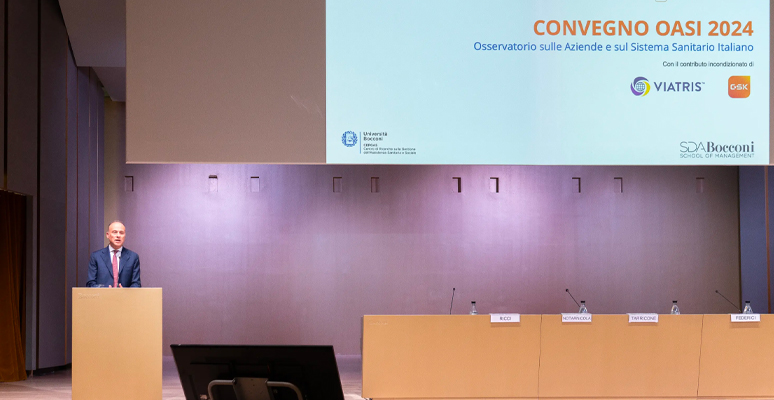
- Start date
- Duration
- Format
- Language
- 2 Apr 2025
- 16 days
- Class
- Italian
Acquire the managerial skills needed to play your organizational and managerial role effectively and govern change in the social care and healthcare system.
The last decade has seen a progressive and impactful transformation of the Italian healthcare system. Following major institutional reforms in the 1990s and the early 2000s, an evolution of all healthcare actors began, involving healthcare professionals, institutional decision-makers and corporate managers. This process introduced the principles of value-based healthcare in daily decision-making practice at all levels, pushing all those involved in various ways to invest in acquiring new skills that can generate value for the system, starting from the patient and extending to society in general.
Further input for development emerged during the Covid-19 emergency in the past two years. The Italian public healthcare system and its people were put to to the test, highlighting the need to invest even more in generating elements of value to support the population and patients. At the various levels of healthcare government an interest in different forms of synergy developed engaging all the players in the system in this generation of value, including non-institutional players such as patients and supplier companies. These synergetic initiatives and projects aim at the co-creation of value, that is, at refining/honing/… joint activities where multistakeholder collaboration takes place in a partnership relationship. This ensures a proper integration of all parties to keep the patient at the heart of the system.
Value co-creation is the pivot of Boehringer Ingelheim’s philosophy, embodied in the Coinnova project by Boehringer Ingelheim Italia. Coinnova aims at defining and developing an innovative partnership model among the various actors in the healthcare system. Listening to and analyzing the needs of patients and institutional players is the first step for Boehringer Ingelheim, in synergy with all other stakeholders, to build projects for improving the management of chronic patients, with significant effects in terms of health and sustainability.
In line with this approach, Boehringer Ingelheim decided to further invest in a change management program to train its access-function employees. This was as of December 2020 and the course ended in July 2021. This pioneering decision to invest in a structured course to support the company at a time when the healthcare system is evolving mainly focused on acquiring and developing the skills for co-creating value-based projects with institutional players. That is why Boehringer Ingelheim chose SDA Bocconi School of Management as its educational partner. For 50 years, SDA Bocconi has supported public and private players, through a combined system of knowledge generation and dissemination, in tackling the challenges related to internal change and acquiring new skills to be leveraged in everyday professional life.
The training program was directed by Francesco Costa and Arianna Bertolani. It was designed around the needs of Boehringer Ingelheim and balanced lectures, experiential activities, digital simulations and testimonies by Italian public and private healthcare professionals. The macro-objective of the course was acquiring a methodology to understand and correctly interpret the needs of institutional actors, in order to jointly develop practical plans to support patients and the healthcare system (co-creation of value). To achieve this goal, the program initially looked into the dynamics of the national and regional healthcare systems , the main drug policies and the principles for evaluating medical technologies. It subsequently focused on the principles of stakeholder management, integrative negotiation with the public sector and public-private partnerships.
Throughout the course participants were encouraged to apply what they had learned in the traditional teaching moments during experiential activities. A series of case studies was developed ad hoc, to recreate the challenges that most characterize the national and regional contexts. In order for participants to further understand the needs of institutional players, several guests from the strategic management of public and private healthcare organizations as well as pharmaceutical companies were invited.
Today more than ever, the Italian healthcare system is experiencing a transition towards greater awareness of its needs and commitment to responding with concrete and effective actions. For this reason, all the actors who contribute to protecting health in various ways have started changing and growing as inspired by the idea of collaboration. Multi-stakeholder collaboration is the driver that will push the entire healthcare system towards a new frontier – the co-creation of elements of value for the patient will be one of the factors to keep our NHS among the excellences in the world.
SDA Bocconi School of Management

Acquire the managerial skills needed to play your organizational and managerial role effectively and govern change in the social care and healthcare system.



